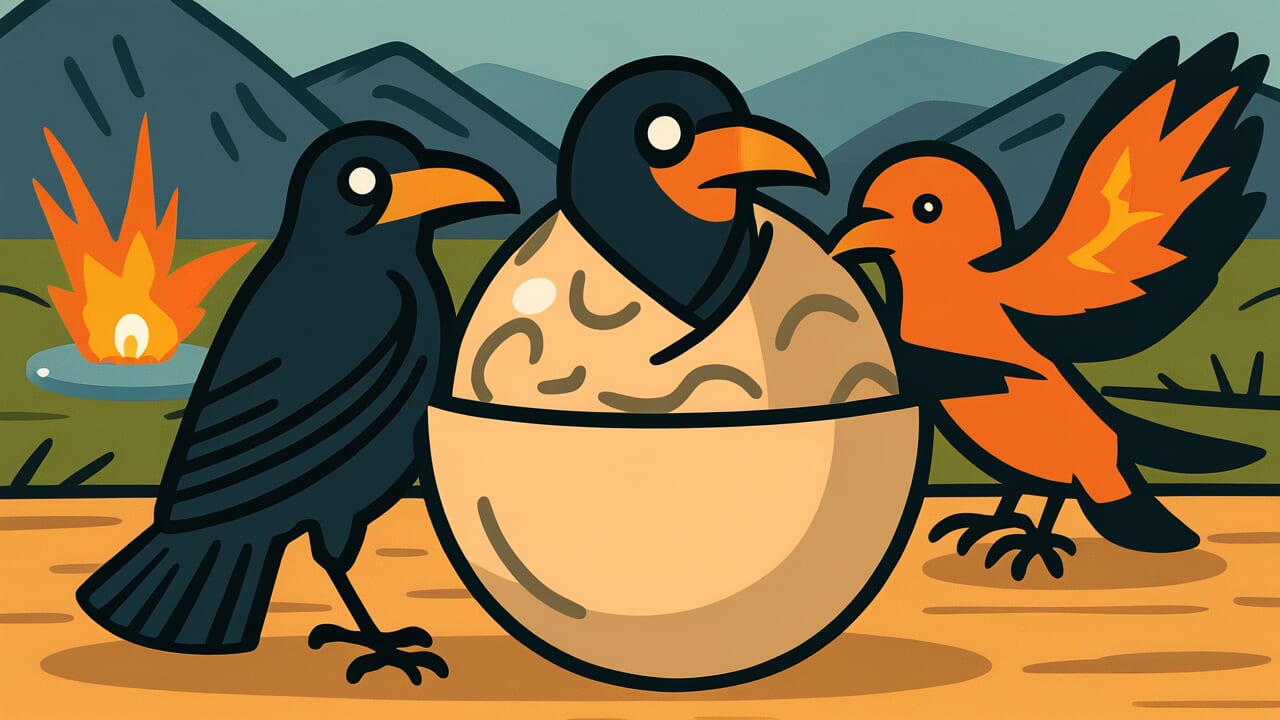How to Read “If you don’t destroy the eggs of crows and kites, then phoenixes will gather”
uen no tamago kobotazareba shikaru nochi ni hōō atsumaru
Meaning of “If you don’t destroy the eggs of crows and kites, then phoenixes will gather”
This proverb means that good things will never come unless you first remove bad or unnecessary things.
When we want to improve an organization or environment, we tend to focus only on adding good things.
However, this proverb teaches us the importance of eliminating bad elements first.
Just as one rotten apple can spoil the whole barrel, if bad elements remain, even the best additions will be ruined.
This saying is used when reforming organizations, cleaning up relationships, or deciding to break bad personal habits.
It emphasizes the need to firmly eliminate old bad customs and harmful elements, not just introduce new things.
Even today, this teaching lives on with the understanding that real improvement requires both destruction and creation.
Origin and Etymology
The origin of this proverb has limited clear documentation, and several theories exist about where it came from.
However, looking at its components, it likely shows influence from classical Chinese thought.
Crows and kites have long been familiar birds in both Japan and China.
The phoenix, on the other hand, is a mythical bird from Chinese legends that appears only when a virtuous ruler emerges.
This contrast forms the core of the proverb.
The phrase “eggs not destroyed” means if you don’t break the eggs.
In other words, unless you remove the eggs of ordinary birds like crows and kites, noble phoenixes will never gather in that place.
Behind this idea lies the Eastern philosophy that good and bad cannot coexist.
The belief that you must first eliminate inferior or unnecessary things to welcome superior ones connects to Confucian methods of achieving an ideal society.
The teaching that excellent things gather only after you purify a space and prepare the environment is expressed through this vivid metaphor.
Usage Examples
- If you leave problem employees alone, talented people won’t come, just like “If you don’t destroy the eggs of crows and kites, then phoenixes will gather”
- After I got rid of unnecessary items in my room, I felt more positive—truly “If you don’t destroy the eggs of crows and kites, then phoenixes will gather”
Universal Wisdom
This proverb has been passed down because it points out a fundamental human contradiction.
We are creatures who desire change yet fear letting go of the present.
When we want to gain something new, we only think about adding more.
Study more, work harder, meet better people.
But what we really need is the courage to remove unnecessary and harmful things from what we already have.
Our ancestors expressed this truth through the striking contrast of crows and phoenixes.
Human psychology has a trait called loss aversion.
We feel the pain of losing something more strongly than the joy of gaining something.
That’s why we can’t let go of familiar things even when we know they’re bad.
Toxic relationships, meaningless habits, environments that eat away at us.
We cling to them with excuses like “I might still need this” or “This could be useful someday.”
But this proverb teaches us with both strictness and kindness.
If you want to welcome truly valuable things, first make space.
No creation without destruction.
This universal truth continues to resonate with people across time.
When AI Hears This
The “competitive exclusion principle” proven by ecologist Gause in 1934 shows that two species eating the same food and living in the same place can never coexist.
For example, if two bird species eat the same nuts, the one that gathers food even slightly more efficiently will gradually increase while the other inevitably goes extinct.
This isn’t a moral issue but a mathematically unavoidable result.
What makes this proverb interesting is how it reframes human society’s “resources” ecologically.
Consider a company organization.
Budget, office space, and the boss’s attention are limited resources.
Unproductive people compared to crows and kites and excellent people like phoenixes are actually competing for the same resources.
If crows and kites occupy that resource niche first, phoenixes physically have no room to enter.
This isn’t about ability but about space.
More importantly, halfway elimination doesn’t work.
In ecology, even if you reduce the inferior species’ population, it will always recover if reproductive capacity remains.
In other words, the thorough elimination of “destroying eggs” was ecologically the correct strategy.
This proverb appears to teach morality but actually states a cold ecological fact.
Lessons for Today
This proverb teaches us modern people that improving life quality requires the courage of “subtraction.”
Modern society is dominated by the value of “more, more”—addition thinking.
More information, more connections, more skills.
But your life as a container has limits.
If you want to fill that container with good things, you first need the resolve to discard bad things.
Specifically, relationships that only drain your time and energy, habits you continue without meaning, environments that are sources of stress.
Identify them and have the courage to let them go.
Decluttering isn’t just for physical objects but necessary for every aspect of life.
However, this isn’t a teaching to become cold-hearted.
Rather, it’s wisdom for truly cherishing what matters most.
We pull weeds to let beautiful flowers bloom.
We remove bad things to welcome good things.
Beyond that lies the life you truly desire.
Don’t fear change.
Why not start by taking one step and letting go of something unnecessary?



Comments